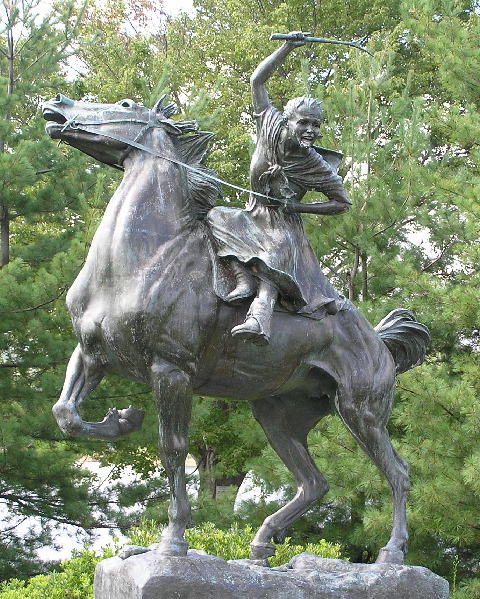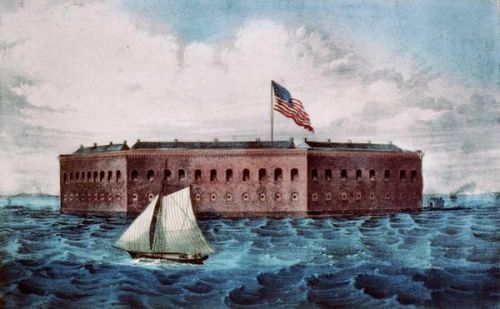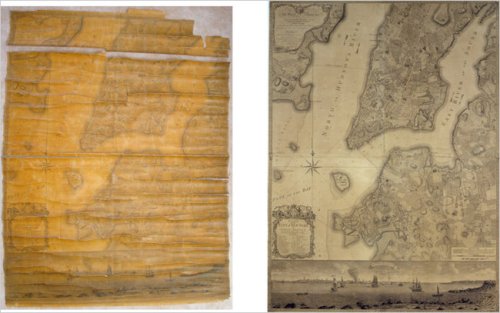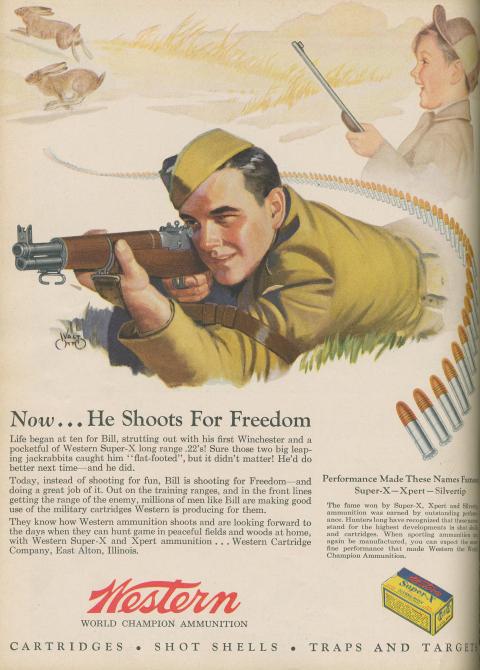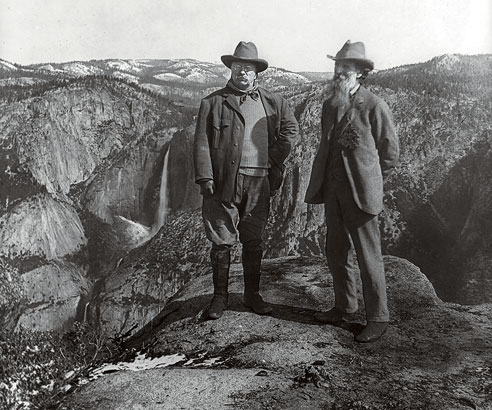It’s a rather corny/gamey/commercial format, but it’s still awfully interesting.
Archive for the ‘That's History’ Category
The Last Living Eyewitness of the Lincoln Assassination
Posted in That's History on October 25, 2011| Leave a Comment »
When History Finds You…All Rewritten On Its Own
Posted in AMUSEMENT: "Muse" Means to Think and "A" Means..., That's History on June 10, 2011| 1 Comment »
I was looking on Google Maps Street View to find the hotel we stayed at in London in 2004 [I wasn’t bored, I had a reason]. I don’t remember the name of it exactly, but could find it in a second on a map. So I was using Street View and Street View has taught me that the hotel was probably bought and remodeled and is no longer a hotel. But as long as I was there, I took a gander around and re-found this ancient plaque that was on the opposite side of the street and a few doors down from the hotel. It made Christie and me guffaw out loud when we saw it.
You can view the plaque here in this link.
And now follow this link to see a close-up picture I took in 2004, to show you what the plaque said. It’s just one word that makes the whole thing worthwhile.
The Art of Letterpress
Posted in GeekFest, That's History on May 16, 2011| 1 Comment »
“Watching” History Unfold
Posted in That's History on May 5, 2011| Leave a Comment »
A fun story from the Smithsonian about the public disassembly of Lincoln’s watch.
A hush fell over the room as the watchmaker halted his work. A partially-dismantled pocket watch that once belonged to President Abraham Lincoln gleamed in his hands. He looked up from his task and pushed a visor, fitted with magnifying glasses for detailed work, up onto the top of his head. “The moment of truth has come!” he boomed. I waited, perched on the edge of my seat, for a verdict—was there really a secret message inscribed inside the watch? And if so, what did it say?
Hero of the Revolution
Posted in That's History on April 26, 2011| Leave a Comment »
On this day in history…
[A] woman who distinguished herself in the Revolutionary War was 16-year-old Sybil Luddington. On the night of April 26, 1777, a messenger rode up to tell her father, a colonel of the local militia, that an attack was about to take place on Patriot munitions stored at Danbury, Connecticut. The messenger and his horse were too exhausted to carry the alarm further, so Sybil volunteered. She rode 40 miles that night, spreading the alarm to the surrounding militia.
— A History of US, Book 3, Teacher Guide, p. 49
150 Years Ago Today
Posted in That's History on April 12, 2011| Leave a Comment »
The Greatest Horse of All Time
Posted in Recommendation, That's History on March 25, 2011| 1 Comment »
The recent Disney release is spectacular…good for the whole family. Secretariat was more than just a good typist, he awed the world with his speed. Here is the actual last race being run…don’t watch if you don’t want to be spoiled by the ending.
Happy Birthday, Dr. Silly
Posted in AMUSEMENT: "Muse" Means to Think and "A" Means..., That's History on March 2, 2011| Leave a Comment »
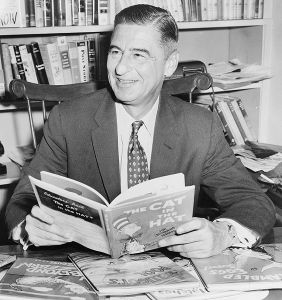 Dr. Suess, the Father of of Bloogs, Bims, Brown Barbaloots, Bellars, Billy Billings and the Blindfolded Bowman from Brigger-ba-Root, would be 107 today.
Dr. Suess, the Father of of Bloogs, Bims, Brown Barbaloots, Bellars, Billy Billings and the Blindfolded Bowman from Brigger-ba-Root, would be 107 today.
Dr. Suess is not remembered for truth, goodness and beauty. His works are not epic. They are not foundational inspirational texts, historical treatises, clear-thinking biographies or theologically astute tomes. His work will not stand on these merits. In fact, he used some of his children literature to convey political idea [the Butter Battle was about the arms race, for instance] and sometimes a strong liberal ideology.
Geisel (his real name was Theodore Suess Geisel) should be known though as epically brilliant as a poet and wordsmith. He was a creative giant who taught us that reading isn’t all Dick-and-Jane-dumb. Belly-laughing is allowed when holding a book of his creative tongue twisters and imaginative illustrations. His books teach us that words are important and very fun.
You may not know that the original pronunciation of Suess is not the pronunciation you know. He wrote these lines early-on to teach people the way it was pronounced:
You’re wrong as the deuce And you shouldn’t rejoice If you’re calling him Seuss. He pronounces it Soice.
He did later change the pronunciation because it sounded more useful to children’s literature.
One of my favorite books of his is a compilation of his early writings–The Tough Coughs as He Plows the Dough. My other favorites are maybe Fox in Sox and Oh Say Can You Say?
25 Years Ago This Morning
Posted in Classical Education, That's History on January 28, 2011| Leave a Comment »
This is one of the best Presidential addresses I have ever heard, and it’s stunning on several fronts. It’s worth hearing several times. Brilliant. Poetic. Historical. Consoling. Gritty. Heroic.
“The future doesn’t belong to the faint-hearted. It belongs to the brave.”
If you weren’t born when this happened, you should know that this event was a much bigger deal than shuttle launches are now. The publicity was heightened even for this one (I remember anticipating it for weeks) and it had even more attention because of Christa McAuliffe’s addition to the crew as the first teacher in space.
The speech was written that morning by Peggy Noonan.
Map Geek That I Am…
Posted in That's History, The Things of This World on January 18, 2011| Leave a Comment »
I loved this story of redemption and renewal from Sunday’s New York Times:
Cunning, Care and Sheer Luck Save Rare Map
Vintage Ads Remembering WWII
Posted in That's History on December 10, 2010| Leave a Comment »
An interesting series of photos from Field and Stream magazine from 1941-1945.
Remembering Pearl Harbor
Still Funny 200 Years Later
Posted in AMUSEMENT: "Muse" Means to Think and "A" Means..., That's History on November 2, 2010| Leave a Comment »
The Berners Street Hoax was perpetrated by Theodore Hook in the City of Westminster, London, in 1810. Hook had made a bet with his friend, Samuel Beazley, that he could transform any house in London into the most talked-about address in a week, which he achieved by sending out 4,000 letters in the name of Mrs Tottenham, who lived at 54 Berners Street, requesting deliveries, visitors, and assistance.
On 27 November, at five o’clock in the morning, a sweep arrived to sweep the chimneys of Mrs Tottenham’s house. The maid who answered the door informed him that no sweep had been requested, and that his services were not required. A few moments later another sweep presented himself, then another, and another, 12 in all. After the last of the sweeps had been sent away, a fleet of carts carrying large deliveries of coal began to arrive, followed by a series of cakemakers delivering large wedding cakes, then doctors, lawyers, vicars and priests summoned to minister to someone in the house they had been told was dying. Fishmongers, shoemakers, and over a dozen pianos were among the next to appear, along with “six stout men bearing an organ”. Dignitaries, including the Governor of the Bank of England, the Duke of York, the Archbishop of Canterbury and the Lord Mayor of the City of London also arrived. The narrow streets soon became severely congested with tradesmen and onlookers. Deliveries and visits continued until the early evening, bringing a large part of London to a standstill.[1]
Hook stationed himself in the house directly opposite 54 Berners Street, from where he and his friend spent the day watching the chaos unfold.
Source: Wikipedia
Why Church History? A Guest Post
Posted in Gospel, Old/Good Ways, Pilgrimesque, That's History on October 18, 2010| 2 Comments »
Many Christians today suffer from historical amnesia. The time between the apostles and their own day is one giant blank. That is hardly what God had in mind.
So says Bruce Shelley, author of Church History in Plain Language. C.S. Lewis called his generation out on their chronological snobbery, that condition in which they/we are so nearsighted, that we almost refuse to look backward to the past. Consider the rare feat among so many to be able to name the names of even their own great-grandparents. They were vital to your history, and you may have even known them. But who were they and what were they about? What about their parents?
I love that my pastor, even though he cares deeply about his ministry, it’s vitality and the state of the flock, does not see our church as the center of anything or as an end of all woes. He sees it as the current, vital cog in the the mandate of God–a part in which we get to play. And just as important, he looks to the past as an important way of living for today and for the future Kingdom we will inhabit.
In our SS class, he is walking us through the history of the church from Christ through the Reformation, and I asked him to answer the question here for us, “Why Do We Need Church History?”
I hope that you will hear.
_____________________________
I’m a pastor and I believe the people I shepherd need to have a rich and colorful understanding of church history. The story of the church needs to be told because it’s our story. It’s where we came from. Church buildings don’t just pop out of nowhere—every part of a worship service from the doctrinal statement to the hymnbook is the result of ideas and traditions being passed down for centuries in the minds and hearts of believers. When we know that history, the entire experience of worship and church life becomes richer and more meaningful—and much more likely of being preserved.
Our connection with other believers (past and present) should be stronger than even familial and national loyalties. I love my country and I am proud to claim John Adams and George Washington as part of my national heritage, but in comparison, I am much more a son of Abraham, Isaac and Jacob, and my communion with Paul, Augustine, and John Bunyan is eternal, not temporal. When we stand together on Sundays and recite the Apostles’ Creed, we are linking arms with something much bigger than ourselves. Our American history is full of providence and mighty acts of God, no doubt, but it is still merely a truncated version of the whole story. A lot of us grew up with more pride in our American heritage than our religious heritage, and we need to change that.
For the church to rally, we have to pass on a heritage that evokes a visceral response, emotionally charged with love and loyalty. The hearts of believers have to be trained to love and hate the right things. If the church is to be preserved, the next generation has to give it more than a head nod—it has to love it fiercely and defend it against its enemies. Our story is full of heroes and tales of bravery, integrity and self-sacrifice. If we want our kids to love the church, then we have to tell them the whole story.
The church is changing a lot right now and the history of the church gives us stability. It gives us a point of reference that grounds us, stabilizes us and gives us certainty as we look out into a quickly changing world. There is nothing new under the sun and every heresy is just an old heresy repackaged for our time. I really believe that the church’s best inoculation from false teaching is simply an awareness of the church’s past. Most of our questions have already been asked and answered, but our ignorance keeps us searching around in circles for answers. We can only stand on the shoulders of giants if we study the past.
 The last, but immensely important, reason that we must know our history is simply gratitude. Abigail Adams wrote: “Posterity, who are to reap the blessings, will scarcely be able to conceive the hardships and suffering of their ancestors.” Our generation’s lackadaisical attitude about church shows that this is sadly true. We owe our ancestors a debt of gratitude and the least we can do is not forget what they did for the church. As the anniversary of the Reformation approaches, it is with great love and pride and gratitude that I remember Martin Luther and the hundreds of other reformers who sacrificed all this world’s pleasures for the sake of the church. Their legacy inspires me to work hard and persevere. It keeps me from getting too tied to this world and this time and this place. It reminds me of our future home where all the church will be united and God’s plan throughout history will be made clearer than we see it now. And it is there that I want to be found faithful in working hard to preserve the only lasting institution of this world: the Church.
The last, but immensely important, reason that we must know our history is simply gratitude. Abigail Adams wrote: “Posterity, who are to reap the blessings, will scarcely be able to conceive the hardships and suffering of their ancestors.” Our generation’s lackadaisical attitude about church shows that this is sadly true. We owe our ancestors a debt of gratitude and the least we can do is not forget what they did for the church. As the anniversary of the Reformation approaches, it is with great love and pride and gratitude that I remember Martin Luther and the hundreds of other reformers who sacrificed all this world’s pleasures for the sake of the church. Their legacy inspires me to work hard and persevere. It keeps me from getting too tied to this world and this time and this place. It reminds me of our future home where all the church will be united and God’s plan throughout history will be made clearer than we see it now. And it is there that I want to be found faithful in working hard to preserve the only lasting institution of this world: the Church.
— Samuel Gage is the pastor of Charity Baptist Church in Joelton, TN.
Sometimes You Need to Be Told What You Are Supposed to Care About
Posted in Gospel, That's History on October 12, 2010| Leave a Comment »
At least that’s what they imply on every commercial, and that’s what I’m doing now–telling you what to think. This month there will be some emphasis put on church history on TBAP. Early church history is the topic of this quarter’s SS lessons, I’m reading two books on it, and my pastor has written an article that will be posted here next week.
It’s not because I’m proficient or wise on the matter that it is emphasized, but rather, because I fear spiritual myopia/amnesia. Let us fear this state:
Many Christians today suffer from historical amnesia. The time between the apostles and their own day is one giant blank.
Bruce Shelley
Listen, Kids! It’s a High-Functioning Ignoramus.
Posted in Capitalism Works!, That's History, The Things of This World on September 15, 2010| Leave a Comment »
Fascinating Ride on Early American Streetcar
Posted in That's History on August 25, 2010| Leave a Comment »
This movie was filmed on Market Street 104 years ago just before the earthquake that destroyed San Francisco. It’s a remarkable snapshot video of a time that seems so far removed from us.
Today in History
Posted in That's History on May 6, 2010| Leave a Comment »
On this date in 1937, the zepplin Hindenburg was getting ready to land in NJ, after a long trip across the Atlantic. It was an inglorious day.
My Fair City Is Under Water
Posted in Goings On, That's History on May 4, 2010| 2 Comments »
I was excited. I love rain and was expecting a great downpour in Nashville this past weekend. If I remember correctly my weather app predicted we we were going to get 1″ on Saturday and then a heavy 3″ on Sunday. We didn’t blink about cancelling our JECA grill-out; it just became a grill-in.
 We weren’t expecting 13″ in two days. We weren’t expecting to break a May record for rain in the first two days of the month. We weren’t expecting the 5th wetest month ever (will be 1st in rank by the end of the month) in two days.
We weren’t expecting 13″ in two days. We weren’t expecting to break a May record for rain in the first two days of the month. We weren’t expecting the 5th wetest month ever (will be 1st in rank by the end of the month) in two days.
We weren’t expecting all of Nashville’s best landmarks to be submerged. The symphony, LP Field, Bridgestone Arena, Opryland Hotel, Opry Mills, the Hall of Fame, hundreds of businesses, thousands of homes are all muddy and polluted. We weren’t expecting billions of dollars (I think that’s what the Governor said) of damage. We weren’t expecting what the Army Corps of Engineers has called a 1,000-year-flood.
One of my teachers was stranded by deep water in her subdivision for two full days (their house is safe), and I think I know 3 or 4 people whose homes were flooded through the 1st floor and a few others whose homes had minimal damage.
It’s surreal. I’m safe and dry and I didn’t need to go anywhere or do anything. 10 miles north, south, east and west of me, there are huge issues. I didn’t need to fear getting my kids through the waters. I didn’t need to find a higher spot. My job was/is to watch and pray and help.
 Monday and Tuesday are giving us beautiful weather, but the Cumberland is just now cresting. Please pray as we start the wringing out process.
Monday and Tuesday are giving us beautiful weather, but the Cumberland is just now cresting. Please pray as we start the wringing out process.
Here are a few links and slideshows that tell the story.
This is video from inside the Opryland Hotel. Most of it was taken from the skywalks through the atriums, where we have walked with some of you when we show you our city: Opryland Filling with Water
Slideshow of Opryland Hotel under water
This is one of the first scenes we saw of the devastation on Saturday. I-24 south of Nashville flooded and a portable classroom floating and then disintegrating on the highway: A Building Floats By
CNN summary as of this morning: At Least 27 Dead
A slideshow from the air by the Tennessean: Aerial Scenes (I have to switch to Internet Explorer to view these).
Broad coverage from the Tennessean.
What Did the Colonial Pastors Think About This Revolution Ruckus?
Posted in That's History on April 26, 2010| Leave a Comment »
Glenn Beck tweeted a link to this online book that offers the opinion of the colonial pastors: They Preached Liberty.
All men are naturally in a state of freedom, and have an equal claim to liberty. No one by nature, nor by any special grant from the great Lord of all. has any authority over another. All right, therefore, in any to rule over others, must originate from those they rule over, and be granted by them.
John Tucker / Newbury, MA / 1771
If you would like the book in print, here are some options.
America: The Story of Us
Posted in Reviews, That's History on April 26, 2010| Leave a Comment »
At Christie’s prompting, we watched most of the two opening hours of the History Channel’s AMERICA: The Story of Us as it premiered last night. In a kernel, it’s supposed to be a 12-hour summary of the history of the United States. There were only a few commercials thanks to Bank of America.
The first two hours sped quickly from John Rolfe and Jamestown, through the Pilgrims, through the Revolution and Independence and ended with mention of Washington’s inauguration.
There are some spectacular special effects used that were pretty compelling and helpful, especially the geographical ones, and the basic story was well-covered. 1620-1789 is my favorite slice of history, so I was feeling a gut check as they skipped too quickly over things I would have liked them to emphasize [they jumped from the first shots of the Revolution at Concord almost straight to Washington being run out of NYC by the British without describing Bunker Hill, Henry Knox, Dorchester Heights and running the British out of Boston.] The story is sticking to the facts and is not really try to lift and inspire. They missed a good chance to revel in American ingenuity and bravery and the stupor it put the British in when they skipped that stuff right there.
The story is also personality-lite. They speak very little about the major players, though I’m wondering if they will spend more time with Washington when it resumes next week.
Real quickly, two other things that really put me out:
- The story was “interrupted” several times by commentary. That’s fine and helpful usually, but the commentary was by high-profile celebrities, not authorities. It wasn’t David McCullough, but it was Michael Douglas commenting on the Pilgrims?, Aaron Sorkin, Rudy Gulliani, and Donald Trump. Colin Powell wasn’t bad and neither was the high-ranking military officer (he was spot-on). But what is supposed to be helpful about Sheryl Crow’s take? And Henry Louis Gates Jr….um maybe, but….really.
- Also, Washington had lots of generals, great ones and influential ones. Friedrich von Steuben was a good general and made important contribution, but to mention only him so they could remind us that he was probably gay was too much and is the kind of tripe I was expecting in the first place.
There are lots interesting parts, and overall, the series should be helpful. Check the replay schedule (they replayed the two hours immediately after the premier but it might also be on through the week) or you can buy the episodes for $3/each iTunes. Or you can wait for the $27 set to come out this summer.
You can check out select scenes from the series, a wonderful American history quiz and a trailer of the series on this site.
Here is another review from the Boston Globe.
What did you think?
Happy Patriots’ Day
Posted in That's History on April 19, 2010| Leave a Comment »
Today is Patriots’ Day in Massachusetts and Maine. On today’s date in 1775, the American Revolution started getting loud.
Paul Revere and William Dawes made their famous run last night. British troops reached Concord and Lexington made their tromp to Concord/Lexington through the night. That “shot heard ’round the world” zinged through the air at Old North Bridge on this date.
Celebrate responsibly.
This Land Is Your Land, This Land Is My Land
Posted in Old/Good Ways, Recommendation, That's History on March 1, 2010| 1 Comment »
This weekend we finished the last (6th) disc in Ken Burn’s series The National Parks: America’s Best Idea. The set is a treasure trove of Americanism and the vast variety and beauty of God’s created world. We enjoyed every drop, sometimes with our jaws hanging open. Every video made us want to go jump in the car and get going on our own National Park tour.
 On this date in 1872, Congress made a brash and unprecedented move of creating Yellowstone National Park. It was an outlandish idea to all the world, and Yellowstone is called America’s First Park, but it could be called the first in the world. Today there are almost 400 National Parks in the U.S. and over 6,500 national parks worldwide.
On this date in 1872, Congress made a brash and unprecedented move of creating Yellowstone National Park. It was an outlandish idea to all the world, and Yellowstone is called America’s First Park, but it could be called the first in the world. Today there are almost 400 National Parks in the U.S. and over 6,500 national parks worldwide.
Peter Coyote is the primary narrator for this set, and his voice and the music are very compelling in building a beautiful mood for telling the story. More than just landscapes, which are stunningly presented, National Parks is the compilation of stories of individuals who loved the parks and sought to preserve and expand them. There are a good number of villains, too.
There were a good number of wonderful quotations from the documentary, but the two words that best encapsulate the whole series are the ones that have been mulling through my mind since I saw it a week or two ago is the idea that being in the parks, experiencing the sheer vastness, experiencing our infinite smallness, promotes the reality of our own “atomic insignificance” as Charles Sheldon said as he stood face to face with Mount McKinley.
Available on Amazon here.
Here is one of many wonderful previews of the story:
There is also a book based on the series.
A Republic if You Can Keep It
Posted in Old/Good Ways, That's History on December 16, 2009| Leave a Comment »
A brief lesson in economics. Sit up. Pay attention. There will be a quiz.
What a Cool Guy!
Posted in Biographical, Patriarchy, Quote of the Day, That's History on November 6, 2009| Leave a Comment »
The opening paragraph of Jean Fritz’ biography Bully for You, Teddy Roosevelt:
What did Theodore Roosevelt want to do? Everything. And all at once if possible. Plunging headlong into life, he refused to waste a single minute. Among other things, he studied birds, shot lions, roped steer, fought a war, wrote books, and discovered the source of a mystery river in South America. In addition, he became the governor of New York, Vice-President of the United States, then President. This was a big order for one man, but Theodore Roosevelt was not an everyday kind of man. He was so extraordinary that when people tried to describe him, they gave up on normal man-size words. ‘A cyclone,’ that’s what Buffalo Bill called him. Mark Twain said he was ‘an earthquake.’ He was called ‘an eruption,’ ‘an express locomotive,’ ‘a buzz saw,’ ‘a dynamo.’
Today in History
Posted in That's History on October 6, 2009| Leave a Comment »
Today in 1536, William Tyndale, “God’s Outlaw”, was martyred by strangulation and burning . He was an enormous impetus in the formation of future Bible translators and their translations.
Part of his legacy, includes the following (from Wikipedia):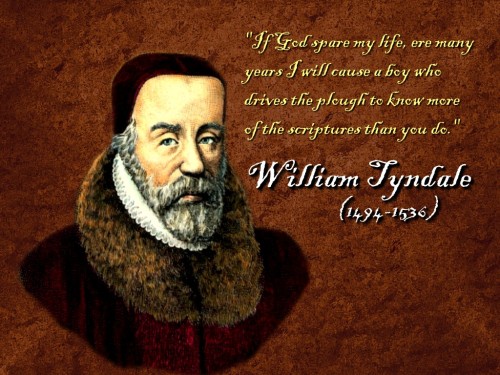
“In translating the Bible, Tyndale introduced new words into the English language, and many were subsequently used in the King James Bible:
- Jehovah (from a transliterated Hebrew construction in the Old Testament; composed from the Tetragrammaton YHWH.
- Passover (as the name for the Jewish holiday, Pesach or Pesah),
- Atonement (= at + onement), which goes beyond mere “reconciliation” to mean “to unite” or “to cover”, which springs from the Hebrew kippur, the Old Testament version of kippur being the covering of doorposts with blood, or “Day of Atonement”.
- scapegoat (the goat that bears the sins and iniquities of the people in Leviticus, Chapter 16)
He also coined such familiar phrases as:
- let there be light
- the powers that be
- my brother’s keeper
- the salt of the earth
- a law unto themselves
- filthy lucre
- it came to pass
- gave up the ghost
- the signs of the times
- the spirit is willing
- live and move and have our being
- fight the good fight”
Today in History
Posted in Goings On, That's History on September 29, 2009| Leave a Comment »
Every day in assembly at JECA, I try to cull through history for bite or two to bring to those students, faculty and parents gathered. I find it’s a great way of broadly introducing things and names that should not be forgotten. It’s a good way to stem our chronological snobbery. Here is a great link to what George Grant wrote of a meeting that Rudyard Kipling and Mark Twain had today in 1889.
Because of my recent time constraints I’ve been blogging less, but have been micro-blogging more through my FaceBook statuses. I sometimes put these tidbits on my status. Meet me on FaceBook.
